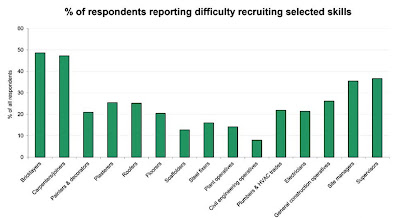However, a sharp fall in public housing is expected to hinder short-term growth whilst significant investment in building a skilled workforce will be needed to support construction in the medium-term - this has long been a problem and there does not seem to be a solution in place in the short-term.
Key highlights from the forecasts include:
- Total construction output is forecast to rise 4.9% in 2015, 4.2% in 2016 and 3.5% in 2017
- Private house building is anticipated to rise 9.0% in 2015, 5.5% in 2016 and 3.5% in 2017
- Public house building is forecast to fall 10.0% in 2015, 5.0% in 2016 and remain flat in 2017
- Infrastructure output is forecast to rise 10.3% in 2015, 10.8% in 2016 and 10.4% in 2017
“Private house building is forecast to rise 9.0% in 2015 and 5.5% in 2016 as it benefits from a strong property market supported by rising real wages, increased mortgage availability and government policies such as Help to Buy. However, public house building activity is expected to fall sharply – 10% in 2015 and 5.0% in 2016 – due to the negative impact of cuts to social rents and the extension of Right to Buy on housing association funding.
Dr Francis continued: “Infrastructure is also forecast to be one of the key drivers of construction growth over the next five years. The government has a National Infrastructure Plan in place with a pipeline of projects across the UK worth £411 billion. As a consequence, we forecast that infrastructure output will experience double-digit growth each year to the end of our forecast horizon in 2019. It’s not all good news, however, as yet again we expect delays until 2018 for the main works on the nuclear power station Hinkley Point C. In addition, due to concerns regarding planning and financing, we do not anticipate main works starting on HS2 before 2020.
“Our forecast growth of 21.7% by 2019 for construction has raised a key risk regarding the lack of skilled labour. Employment in the UK construction industry is now 390,000 lower than at its 2008 peak. So far, the lack of skilled labour has primarily affected the house building sector. As the wider industry activity picks up, however, this issue is likely to spread across the industry. In the short-term, it is already putting upward pressure on costs. In the medium-term, the forecast growth will not be possible without significant investment in skills.”
Take a look at the latest construction industry sales jobs.
Image: FreeDigitalPhotos.net










